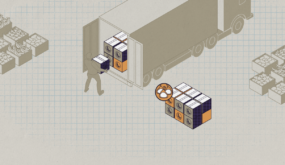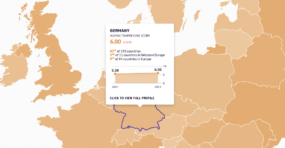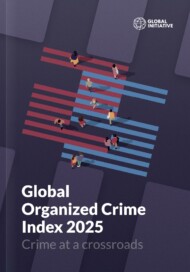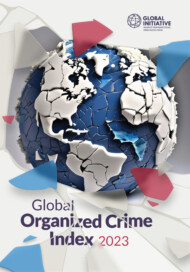Posted on 26 Mar 2025
In February 2021, 16 tonnes of cocaine were seized in Hamburg – Europe’s largest cocaine seizure to date. Since then, there have been numerous other seizures at Europe’s third-largest seaport, as the flow of cocaine into Germany continues unabated. But the 2021 case has grabbed the headlines for a different reason: it appears to be connected to a corruption scandal that has sent shockwaves through the German criminal justice system.
In late 2024, the lead public prosecutor in the Hamburg cocaine case, a member of the Hanover Prosecution Service, was arrested on corruption-related charges, as reported by public news broadcaster NDR. The prosecutor is awaiting trial on 14 counts of accepting bribes and leaking classified information in return. He stands accused of leaking information related to the investigation into the seizure, warning suspects of their imminent arrest and accepting payments from the cocaine network. These details came to light through the decryption of Sky ECC communications. The prosecutor, who remains detained, has reportedly denied the accusations.
The implications are thought to extend further, as a public media outlet reported. According to this information, the prosecutor is said to have leaked sensitive information also to a member of the Hells Angels in exchange for bribes. Furthermore, the state attorney’s brother-in-law, a convicted drug trafficker, may have brokered the sale of sensitive information to criminals on the prosecutor’s behalf. In a related case, an IT service provider for the Lower Saxony state police, headquartered in Hanover, is under investigation for reportedly leaking information from police systems. The company’s founder has a previous conviction for cocaine trafficking and is allegedly linked to the Hanover cocaine network.
Germany ranks 15th in Transparency International’s Global Corruption Barometer, making it, according to the TI metric, among the least corrupt countries in the world. While overall corruption cases are on average lower than they have been in the past five years, developments like the Hanover case may be a sign of greater levels of systemic organized crime in Germany.
The country has witnessed rapid growth in the cocaine trade in recent years, bringing with it heightened risks of organized crime-related corruption. In Europe, no other illegal substance offers higher profit margins or has seen comparable growth. According to data from the European Drug Trends Monitor, a kilogram of cocaine can fetch as much as €70 000 when retailed in major European cities.
With demand steadily increasing over the past decade, cocaine has empowered organized crime in Europe and provided organized crime groups with the means to influence law enforcement and the criminal justice system.
This case may be an example of how highly profitable drug markets are capable of surreptitiously infiltrating the licit economy, criminal justice systems and law enforcement – even in countries that are perceived as bastions of transparency, integrity and rule of law. Beyond the visible cases, there is a significant risk of underreporting. According to Europol, nearly 60% of all criminal networks in Europe employ corruption to sustain their operations. And even before the cocaine surge, established criminal groups such as the Italian ‘Ndrangheta mafia had allegedly cultivated relationships with German politicians, administrators and criminal justice officials.
How real is the threat?
Undertaking a wholesale audit of organized crime-related bribery activities in Germany would be challenging. However, given the boom in the cocaine market, it is arguable that the problem extends beyond the Hanover case and may have developed into a broader threat. And this case appears to be part of a growing pattern of organized crime-related corruption in Germany, which has come to the fore in recent years.
In 2023, Berlin police reported 76 corruption cases, many of which involved the bribing of prison staff. In the same year, Berlin police reported that two members of the capital’s police force had been investigated for leaking information from internal police systems to outside parties. Many of the cases involve law enforcement and are related to the drug trade. In January 2025, a senior police officer was detained in Hanover for allegedly accepting bribes from a drug trafficking network, as reported by the Hanover Prosecution Service. In November 2024, a narcotics police unit officer in Offenbach was arrested on charges of colluding with drug traffickers and receiving payments for his services. In August 2024, a police officer in Bonn was arrested based on allegations that he had passed sensitive information to members of the ‘Mocro’ mafia – key actors in Europe’s cocaine trade.
All of these cases point to Germany’s growing drug challenge and its diminishing resilience in the face of booming illicit markets, as confirmed by the Global Organized Crime Index. But the list only scratches the surface of the problem.
What needs to be done?
While the judicial system has responded swiftly to these cases, it is reasonable to assume that only a small fraction of incidents have been uncovered, given corruption’s ‘victimless’ nature and the benefit to both bribe giver and taker.
Authorities are seeking to respond by stepping up prevention efforts. The Hamburg Port Security Centre launched a campaign in 2024 to shield port workers from the influence of organized crime and has established an anonymous whistleblower platform for reporting suspicious activity. Berlin has operated a similar platform since 2015, which has collected around 3 900 tips on suspected corruption. Despite these efforts, it remains to be seen to what extent such interventions will enable German authorities to come to grips with the growing risk of organized crime-related corruption in the country.
Germany has long underestimated the risk that organized crime poses to national security and stability, often viewing it as a problem plaguing other nations rather than a domestic concern for a country that prides itself on strong rule of law and civic compliance. However, escalating levels of drug-related violence on the streets accompany the largely invisible corruption threat, with severe consequences for safety and stability.
Whether these latest developments will serve as a much-needed wake-up call for the incoming German government remains to be seen. A key initiative proposed by the outgoing coalition, establishing a new Federal Agency to Counter Financial Crime, failed to materialize during the last term, a setback in the fight against organized crime. At the same time, there are growing calls for Germany to adopt a law to counter the layering of finances, aimed at strengthening the country’s comparatively weak anti-money laundering controls, a crucial strategy for limiting organized crime’s financial capacity for corruption. Finally, Germany has yet to fully harness civil society’s potential in countering organized crime, despite repeated calls for the establishment of a civil society monitoring body, an important element of a coherent approach to tackle this challenge.
Incidents like the Hanover cocaine case, in which a public prosecutor is awaiting trial, would suggest that the rule of law is threatened, and that Germany’s institutional resilience may be insufficient to withstand the corrupting power of the highly lucrative drug economy. As financially empowered and increasingly bold criminal networks extend their reach into Germany’s criminal justice system, law enforcement and the licit economy, the country faces a critical choice: strengthen its institutional safeguards and societal responses against organized crime-driven corruption or risk the undermining of its institutions and losing its reputation for integrity.



